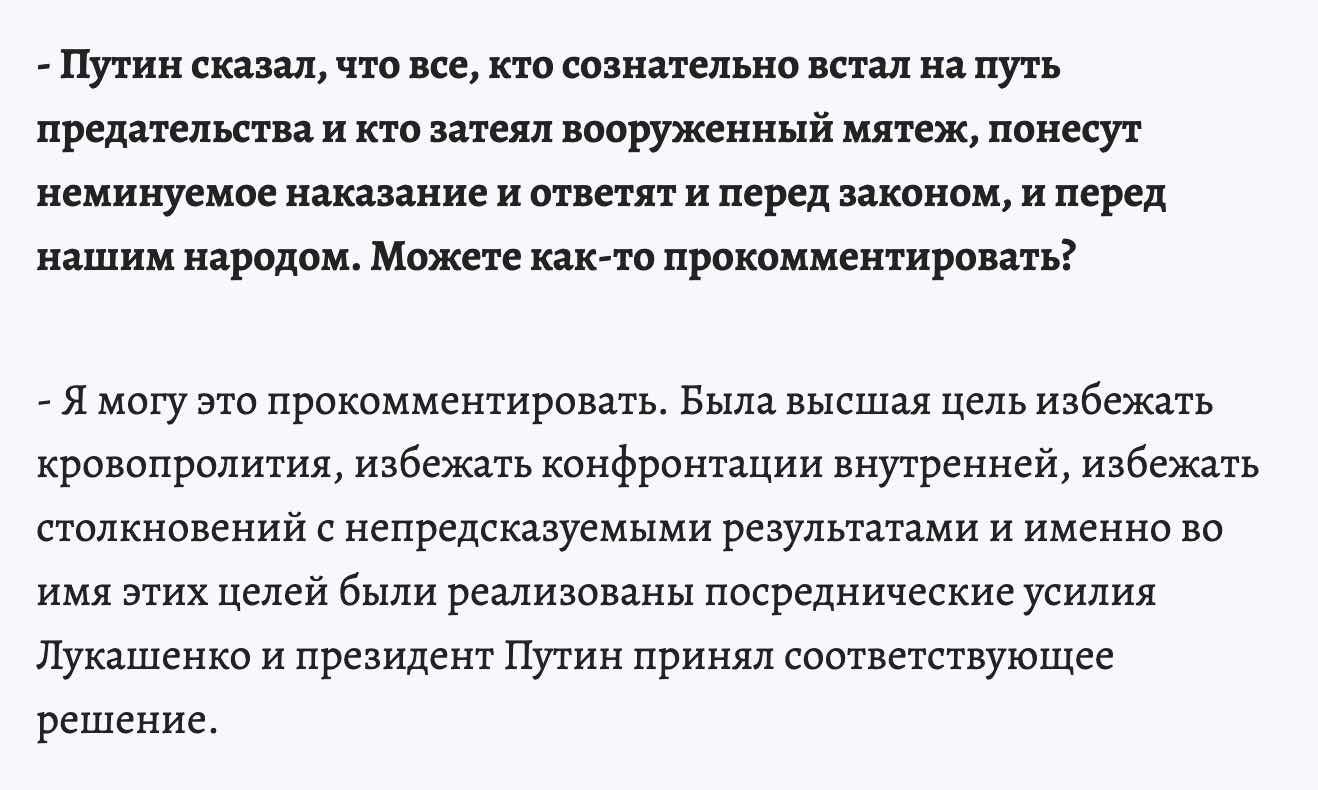Via Ian Miles Cheong Twitter
On numerous occasions I wrote here about the discrepancy between “export” and “domestic” versions of Russian propaganda. English pro-Russian Twitter accounts, often written by people having no understanding of Russian language, yet cosplaying some “Donbas Devushka” or “Big Sergey”, portray a different country than pro-Russian Russians.
The Prigozhin Putsch provides a great example. In the pro-Russian English world, it was another success of Putin The Undefeatable. In a brilliant honeypot 5D chess move, he identified the traitors and reemerged as strong as ever, with Russia united behind him.
Russian Russians paint a gloomy picture. They focus on two things.
Snippet from Readovka Telegram channel
First: casualties. Pro-Russian Russian account “Readovka” reports 15 killed in action (some estimates are slightly higher), most of them pilots.
6 helicopters and one plane are lost (according to Pro-Russian Russian account “Rybar”), mostly with their crew. Very good news for all-pro Ukrainians is the loss of Ka-52 with their crew - you can’t replace trained gunship crew with fresh mobiks! But the loss of Il-18(22) command airplane and 3 specialised electronic warfare Mi-8 MTPR’s are enough to open “Sovetskoye Igristoye” in pro-NATO circles.
Via Telegram Channel “Povyornutye na Z voyne”: I did not want, but I will say it. The dead young boy from K-52 left a baby daughter”.
People killed by Wagner aboard these planes had families. “One boy aboard the Ka-52 had a baby daughter”, reports a pro-Russian Russian milblogger with “Z” in his nickname. I wonder what he thinks of the pro-Russian English morons who call this coup “relatively bloodless”?
The Russian Russians don’t feel “united as ever”. That’s the second thing. “The column of Wagnerites did not move along the asphalt - they moved through the people’s hearts, cutting society in two”, claims Alexandr Khodakovsky.
"Our country will never be the same”, claims Alexandr Khodakovsky, and he does not mean it ina good way - via his Telegram channel
They also don’t feel “stronger”. They saw a burning refinery in Voronezh, they saw weird “anti-tank” ditches and barriers erected in panic on the M4 highway.
They ask: how is that even possible that a hostile column can ride towards Moscow for a whole day - unopposed? Why did Putin promise severe punishment for the rebels - and backed down with no explanation? The consensus in the Russian Russian Telegram is that the putsch made Putin and Russia look weaker, not stronger.
Khodakovsky moves on to say: “This is the fourth putsch in my life. Each of them started under some benevolent pretext but each made things worse (…) Millions of people experienced fearful thought that everything they stood for could be erased in one day. These millions will never be able to look into the eyes of the perpetrators without judging them for the loss of our helicopter, shot by our yesterday’s own”.
Four putsches in one lifetime, that’s a bunch! But in Russia, they call it Friday.
Many people in the West just can’t believe all of this. What did Prigozhin try to achieve? It’s too insane, too poorly planned and executed. There must be some hidden agenda here! Obviously, it’s all a show!
Via Telegram channel “Voenkor Kotenok Z”
“Obviously it’s not a show” - answers them another pro-Russian Russian Russian, Voenkor Kotenok Z - “aircraft was lost, pilots died”. In his rant, he blames the authorities for gross neglect. He says that it’s not the putsch that was ill-prepared, it’s the preventive measures that are truly laughable.
“12 bags of sands and a machine gun? It’s ridiculous, the tank would not be even distracted, it will just move on” - he says, asking the 100 million roubles question: “what if tomorrow the enemy does the same, enters from Sumy oblast forests, bypassing Kaluga, and rides towards Moscow?”.
A meme circulating in Polish social media during the Saint John’s Night (or as we like to say, “the night of Kupała, the ancient Slavic deity of all the good things in life”)
In Polish social media there was a meme with Prigozhin looking extremely hungover (he usually does), saying “I had one too many, cant’t remember a thing, I hope I didn’t do anything too fucking stupid?”.
When you look at the history of putsches, they usually look like this. You ask this question with failed putsches. You (usually) don’t ask it about the successful ones, but I think they are similar. The latter ones just lucked out.
The 1923 “Bierhalle putsch” of one Adolf Hitler was also ended in ridicule. But who had the last laugh 10 years later?
The key ingredient of any putsch is someone willing to say, after Cesare Borgia: “aut Caesar, aut nihil”. Either win and become a tyrant or perish. Put everything at stake and roll the dice. Either they are lucky, like the original Caesar - or not, ending up as a footnote.
This attitude is the essence of Russian soul, according to no one else but Fyodor Mikhailovich Dostoevsky himself. In his novel “The Gambler” where he deals with his own gambling addiction, he frequently makes the comparison of Russians to French, German and Polish (the most despicable of all nations, according to Dostoevsky).
The novel is written in first person (and as we known historically, it was written in a hurry), so it is impossible to differentiate the author’s own opinion from the opinions expressed by his alter ego Alexei Ivanovich.
In one scene, Alexei claims that “roulette was devised specially for Russians” - because the thing he despises the most is “the German method of heaping up riches” by boring, honest labour. Alexei wants only one of two things: either winning up big at the roulette or losing everything and killing himself. Which one of these results it will be, that’s irrelevant, as long as it’s not some boring bourgeois existence as a “Vater” of family “who is horribly beneficent and extraordinarily honourable. So honourable is he that it is dreadful to have anything to do with him” (quotes from English translation by C. J. Hogarth).
This poster of “Los Hermanos Karamazov” is definitely trying to tell you this is a story about, umm, something else that it actually is. But I kinda love it anyway. And let’s be honest: Yuliy Borisovich Briner would make a great Prigozhin if all of this was turned out to be a Hollywood movie.
Prigozhin is a character taken straight from Dostoevsky’s novel. This is not a compliment. Like Dmitry Karamazov, he’s not afraid of killing, he’s not afraid of dying, the only thing he fears is a boring, bourgeois existence. Like Stavrogin, he has no morals to stop him.
While the West obviously does have its share of putsches and coups, they constitute a particularly important element of Russian political culture. While in Russian language there exist expressions for “coup d’état”, “civil war”, and “mutiny” (resp: perevorot, grazdhdanskaya voina, matyezh), they do also have an umbrella term covering all that and a kitchen sink: smuta. This word was also frequently used in Russian telegram last weekend.
Vladimir Solovyev depressed (as usual) by what this failed Putsch is telling about the Russian ability to ward off attacks on Moscow. He’s not anti-government, on the contrary. But even the most ardent pro-Kremlin propagandists are unable to spin it of the good. Via Youtube channel “Russian Media Monitor”.
When you look at the image of Stalin, Putin or Peter the Great, you sense stability of power. It’s actually wrong, but the unlucky artist would not survive painting a more accurate picture.
Peter the Great (1672-1725) is usually credited as the father of modern Russia. Let’s accept it for sake of discussion and notice an interesting fact.
Much like all tyrants, Peter the Great left the question of succession open, giving vague promises to many contenders. That’s actually quite typical: virtually every Logan Roy of every historical era does the same.
This resulted, of course, in a series of conspiracies and plots, resulting in death of his son and a brief rule of Catherine I (not to be confused with Catherine the Great).
She was a commoner of Polish origin (Marta Helena Skowronska), she outsmarted all her rivals, but her rule was seen as an abomination. However, her successors were becoming only weirder and weirder, up to the baby-tzar Ivan VI, crowned at the age of 2 months, soon to be overthrown by his niece and then imprisoned for 20 years in solitary confinement only to be murdered as a side effect of a failed coup he never even knew about - what a life!
Suffice to say that in the 18th. century, being a Russian emperor was a contact sport. You were quite likely to be murdered by your wife, mother or aunt - women frequently emerged victorious as the last one standing in the palace intrigue, so we have a succession of very interesting women in charge during that period.
It all changed with emperor Paul establishing a strict patrilineal succession (to quote Kendall Roy, “I am the oldest boy!”). He hated his mother (and he really had good reasons well beyond the standard Freud-thingy), but soon after promulgating this law he was murdered by his brother. What was he thinking?
Of course, some tzars died of natural causes - it’s impossible to calculate the odds, because in their later days, as they were getting older and weaker, they usually isolated themselves surrounded only by the most trusted entourage. Since we know otherwise that the most successful coups are precisely those done by the most trusted entourage (“et tu, Brute”?), we might never know the exact number. In some instances, there is basically just one source saying “his majesty passed away peacefully in their sleep” (while frantically trying to wipe a knife).
This man just gotta go, declared his enemies. But the ladies said: don’t you try to do it, please. No doubt this Rasputin had lot of hidden charms - though he was a brute, they just fell into his arms. Then one night some men of higher standing set a trap (they’re not to blame!). Come to visit us, they kept demanding. And he really came… - if there was any true Russlandversteher in Germany, it was Frank Farian of Boney M. Via Youtube.
Again: disputed succession was also a frequent event in the Western monarchies. But I don’t think it ever happened in Westminster after 1688. Did it? I’m not sure, the question is genuine.
In general, in modern times in the West they could - and they did! - have a revolution to overthrow monarchy. But a palace intrigue when a niece is murdering her cousin to steal their crown? I really can’t think of any example. Outside of Russia, of course, because palace coups became their specialite de la maison precisely at the same time, the time of Peter the Great.
Only the most successful Russian coups made it to the Western common knowledge. Everybody knows about the Bolshevik revolution, but not so many do about the Pugo-Putsch or the makhnovststchina. There’s a reason they need an umbrella term for all kinds of mutinous behaviour, some of them are really hard to classify.
I’m not crazy enough to predict the next smuta in Russia, but Putin appeared weak from the Prigozhin putsch. He declared harsh punishment in the morning and full amnesty in the evening.
You don’t do that, that’s basic Macchiavelli. Be harsh when you have to, be lenient when you have to, but not to the same person on the same day. You really need to make up your mind before you go public.
A snippet from: Aleksandr Gamov, “Vlasti ne budut presledovat’ vagnerovtsev”, Komsomolskaya Pravda, 24.6.2023
And this is public enough to be mentioned in the official Russian media. “Komsomolskaya Pravda” (nicknamed “Putin’s newspaper”) is asking this very question to Peskov, getting a vague, avoidant answer. It does not look good.
In Russia, “discrediting the armed force” is a crime punishable by prison. Up to last weekend, only a few military bloggers with good krishas dared to do so. Now people who put “Z” in their nicknames openly criticise Shoigu and indirectly Putin.
But the most important point I’m trying to make is that Prigozhin’s putsch was not something unusual for Russia. On the contrary, that’s just your garden variety smuta. Any middle-aged Russian such as Khodakovsky has already seen four, so you can excuse them for being a bit blasé about it.














Are you sure about the use of the word "smuta"?
I have always understood it as a period of time when the state collapses and there is no strong ruler. Mutinity is not needed here. That is why the whole 90s is often called smuta - there was President Yeltsin and there was no mutinity, but the government was weak. Wages and pensions went unpaid for months. People were uncertain about their future. And worst of all, there was no one to ask for help against the local boyars.
Then Putin came along and ended it. He bombed rebellious Chechnya, he started paying pensions on time (thanks to rising oil prices, but who cares...) and he removed old boyars from power and punished some of them. And he ended with "dermocracy" (shitocracy), which led to Yeltsin-era smuta. So the election results did not decide who will rule, it is the ruler who decides about the election results. Also, many elected officials were changed to presidential appointees.
Of course there were new boyars, but people knew that the tsar loved them and that they could ask him for help. And at least once a year he had a big TV event where he solved the problems of a few commoners and jawed at stupid officials. The smuta was over.
Now that one of the boyars has almost managed to take over Moscow, it seems that a new smuta is about to begin...
A very interesting post.
Russian language skills, that I lack, appear necessary to gain full benefit. There may be a way to copy and paste cited passages into Google Translate; however, I am not finding it.